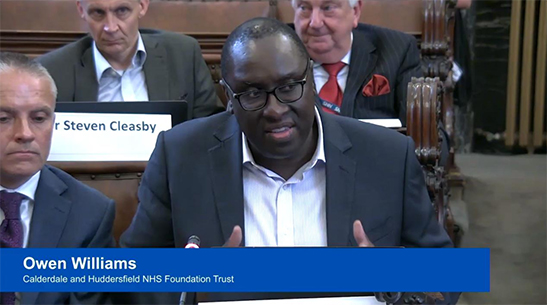ALTHOUGH almost 14 per cent of the UK population are BAME (black, Asian and minority ethnic), just two per cent of chief executives in the public sector belong to this group. A University of Huddersfield researcher, who is also a leading NHS executive, has investigated the issue and developed approaches that could help redress the balance.
Dr Owen Williams OBE emphasises the importance of "gatekeepers" - the people who are in a position to select and appoint senior executives in the NHS and fields such as local government. In his DBA thesis, he argues that they need to question their true levels of commitment to achieving greater levels of diversity.
As a black man, Dr Williams has had a successful career in local government and the NHS, culminating in his present role as Chief Executive of the Calderdale and Huddersfield NHS Foundation Trust. In the 2020 New Year's Honours list he was awarded an OBE and he was recently asked to lead a national piece of work across the NHS with regards to health inequalities.
In order to research his doctoral thesis - supervised at the University of Huddersfield by Emeritus Professor Christopher Cowton - Dr Williams carried out semi-structured interviews with a sequence of senior public service gatekeepers who had appointed BAME chief executives.
"They were people who had done something that was unique and through the use of appreciative inquiry I was asking what advice they would pass on to gatekeepers who had not experienced the recruitment of a BAME chief executive. Many want to do it, but find it hard," said Dr Williams.
 Dr Owen Williams
Dr Owen Williams He uses the term "conscience cleansing" to encourage gatekeepers to ask themselves how serious they are about greater diversity in their organisations.
"To what degree do they live up to that ambition or do they sometimes undertake activities which will give the impression that they are committed but do not necessarily follow through?" said Dr Williams.
"This is conscience cleansing," he continued. "On first impression that might be seen as negative, but one of my interviewees suggested that even if someone conscience cleanses at least that's a step forward from doing nothing."
Dr Williams has also coined the term "diversiast" to describe gatekeepers who are enthusiastic about achieving ethnic diversity, but he argues that they also need to develop the skill of understanding diverse viewpoints so that they do not cause opinions to become entrenched.
"The skill is to become inclusive as opposed to exclusive," he said.
Another key theme in the thesis is the importance of headhunters who assist gatekeepers with executive recruitment. Without a change in their attitude, they will continue with policies that favour white applicants - people in their own image - argues Dr Williams.
- "Headhunter shaping" is the focus of a new research paper that Dr Williams is working on, as a follow up to his DBA thesis, which is titled Addressing the challenge of appointing more public sector Black, Asian & Minority Ethnic (BAME) Chief Executives through utilising an Appreciative Inquiry research framework. A summary can be seen online. Also available online is a recent seminar conducted by Dr Williams titled Passing through the gates of "conscience cleansing" and "diversiasm" to a world of more BAME CEOs.






